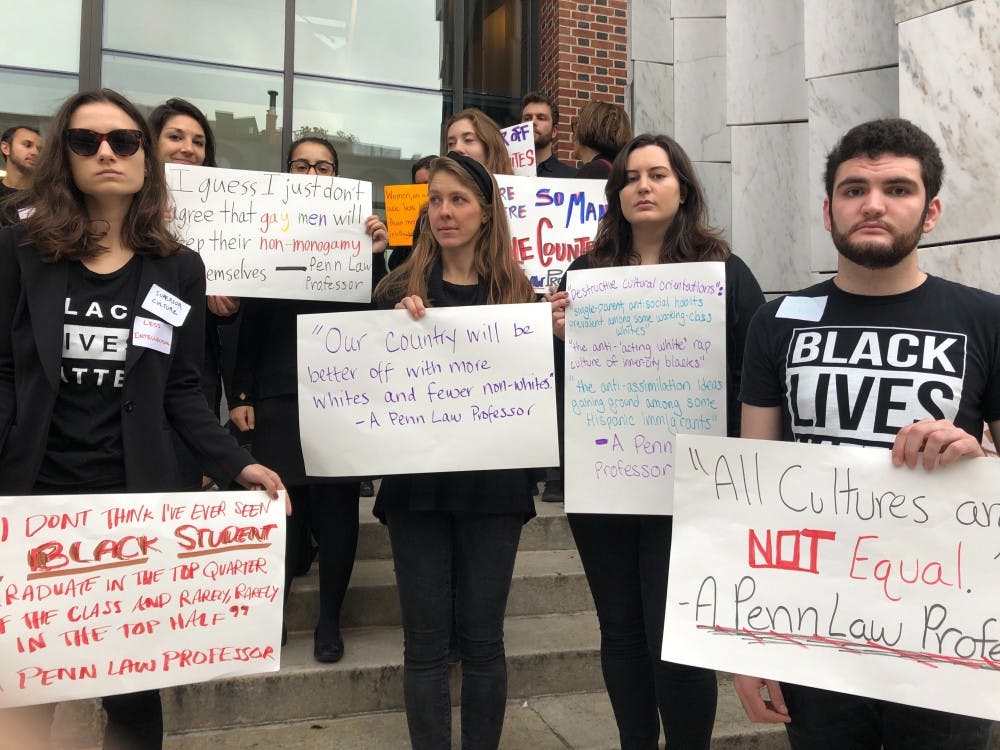More than 50 students in all black clothing protested against controversial Penn Law School professor Amy Wax’s continued tenure and employment.
At 8 a.m. Monday, protesters began marching from the Starbucks located at 34th and Walnut streets toward the Sansom street entrance of the Penn Law School building. The protest then continued in front of the Law School building until 9 a.m., when classes began for law students.
Students carried posters showcasing inflammatory statements made by Wax that they believe marginalize many students at Penn. Some posters read: “America is better off with more whites and fewer nonwhites — A Penn Law professor.”
The protest was planned on the same day as Parents and Partners Day, an annual event where law students’ parents and partners are invited on campus to experience a day in the life of a first-year law student.
In July 2019, Wax argued for an immigration policy favoring immigrants from Western countries over non-Western countries at the inaugural National Conservatism Conference. Thousands have since signed a petition released by the Latinx Law Students Association on July 18 calling on Penn Law to denounce Wax’s statements and relieve her of all teaching duties, “as they serve to further her platform and lend her legitimacy.”
Wax's comments prompted Penn Law Dean Ted Ruger to release an official statement on July 23 stating that Wax's remarks were at odds with Penn's values and policies, and he pledged to work with students to "heal" from the experience.

Photo by Sarah Best
“At best, the reported remarks espouse a bigoted theory of white cultural and ethnic supremacy; at worst, they are racist," Ruger wrote.
RELATED:
Penn Law minority student groups plan to protest Amy Wax on Monday morning
Undergraduate Assembly demands that Penn fire Amy Wax for violating University policy
Protesters said Wax's continued employment at Penn Law "harms" students, and they hope the protest will spark the University to take further action against Wax.
The protest not only urges the University to discontinue Wax’s employment but also gives attention to the “greater culture of racism and homophobia and xenophobia within Penn Law and the University," said Sharon George, a second-year Penn Law student and president of the South Asian Law Students Association.
Penn Law affinity groups, such as the South Asian Law Students Association, the Black Law Students Association, the Muslim Law Students Association, the Asian Pacific American Law Student Association, the Latinx Law Students Association, and Lambda Law, organized the protest with the help of the National Lawyers Guild, a group that promotes human rights.
Wax’s continued employment by Penn Law inflicts “immense damage” for students, said Maddi Gray, second-year Penn Law student and co-chair of the National Lawyers Guild chapter at Penn.
“We’re hoping that today people will join our call to fire her just to create a more inclusive space at the Law School that actually rectifies the harm that is being done,” Gray said.

Photo by Sarah Best
First-year Penn Law student Zach Marino, who is a member of APALSA and Lambda Law, added that the administration has been “very slow to take action” and hopes the protest’s visibility will encourage the administration to fire Wax.
On the steps of the Penn Law School building, second-year Penn Law student Aseem Chipalkatti, who serves as SALSA's Distinguished Speakers and Conference chair, said the administration’s past actions against Wax make him “absolutely” hopeful Wax’s tenure will be removed. Chipalkatti cited Wax’s removal from teaching a mandatory first-year class in 2018 as a positive sign the University will continue "in its previous pattern of listening to its students and taking appropriate action.”
In spring 2018, students and alumni responded with outrage to a video of Wax in which she says she has never seen a black Penn Law student graduate in the top quarter of their class. Days after the backlash, Ruger announced that Wax would no longer be allowed to teach a mandatory first-year course.
George said Wax’s words not only impact specific minority groups but all students at Penn.
“It’s easy when you’re in graduate school to have these type of comments swept under the rug and we wanted to show the University that her words and the University’s lack of actions has an effect on the majority of its student body both students of color, gay students, and white students, and it’s not just an issue for one marginalized group," George said.









